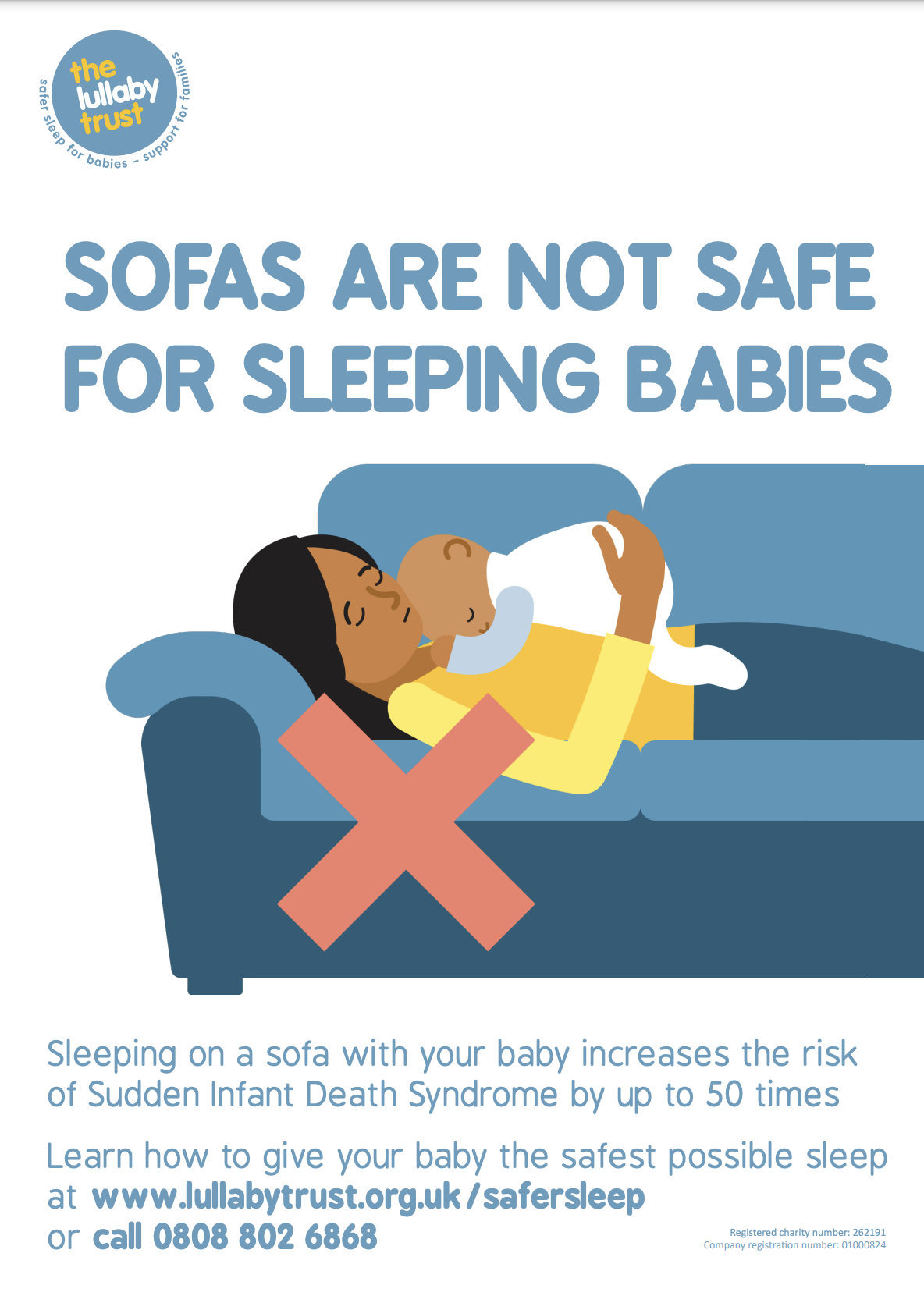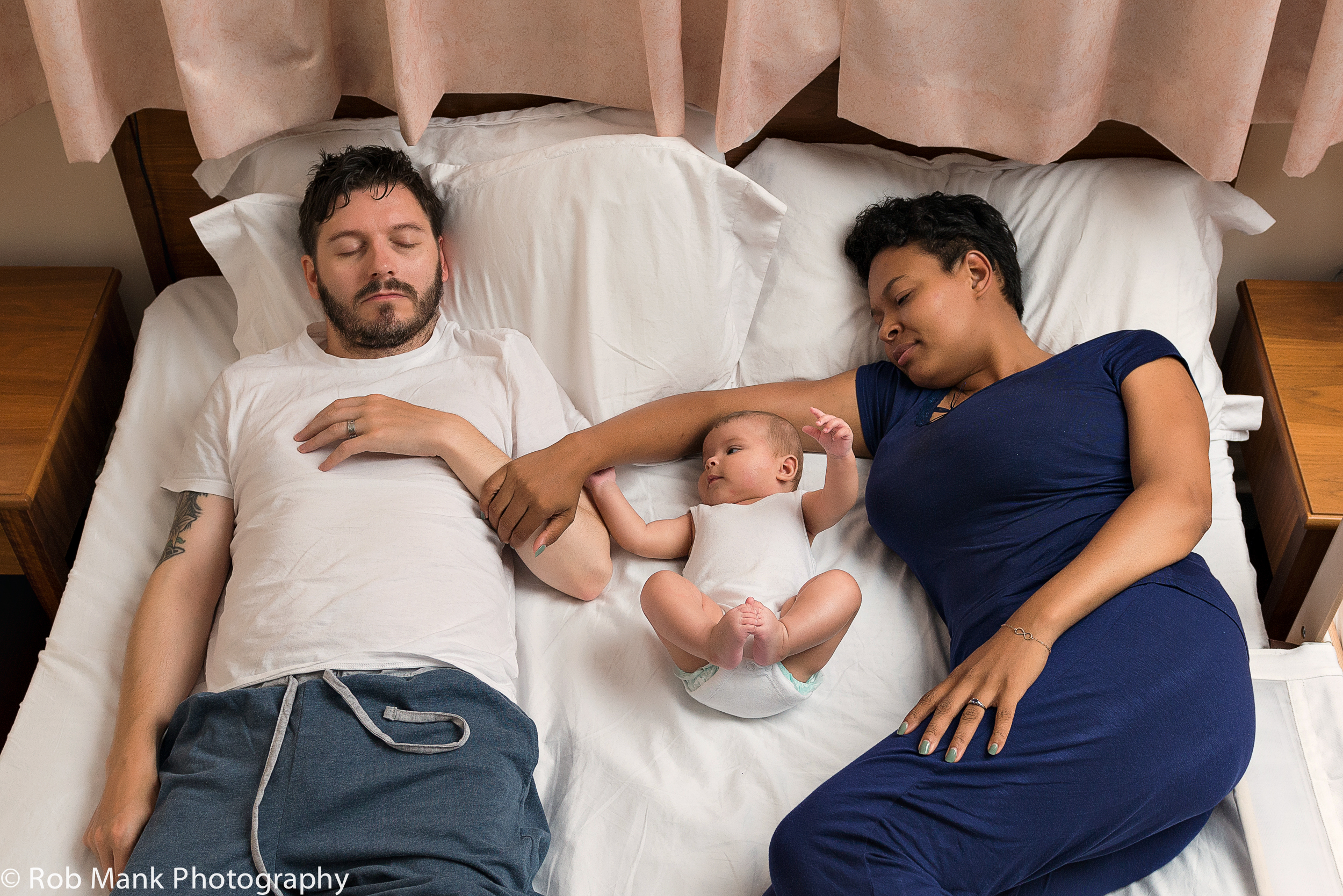
Ask DadPad, Parenting Advice, Safety, Sleep
Ask DadPad: How do we safely co-sleep with our baby?
Posted on 17th March 2023
Keeping your precious baby safe when they sleep is a really important topic for all parents-to-be and new parents to get educated on, in order to reduce the risk of sudden infant death syndrome (SIDS) and other dangers.
As a dad, it’s important that you take the time to find out for yourself as much as you can about safer sleep best practice – including in relation to co-sleeping – so you’re able to work together with baby’s mum to make joint and informed decisions about where your baby will sleep and what equipment you will (and won’t) need in this respect, as well as being alert to potentially dangerous situations when either of you is caring for your baby.
In addition to the core safer sleep advice contained in our DadPad resources, we’ve already published a few blogs on this really important topic – covering safe sleep in general, the Every Sleep Counts and Lift the Baby campaigns, as well looking at the developmental reasons why it’s unrealistic to expect your newborn baby to sleep through the night – but this time we’re going to look at the sometimes controversial topic of having your baby co-sleep with you.
We’re focusing on co-sleep this week as it’s the theme of this year’s The Lullaby Trust #SaferSleepWeek.
What does it mean to co-sleep?
In simple terms, co-sleeping refers to the situation that occurs when baby/ies and parent/s sleep together on the same surface. Some people might alternatively use phrases like ‘bed-sharing’, but the important thing to recognise is that co-sleeping extends to cover any situation when a parent and baby fall asleep on the same surface – including sofas and chairs.
Even though it is well-recognised* that:
The safest place for your baby to sleep is on their back in a cot or Moses basket in the same room as parents/carers for the first six months
…figures quoted from a 2023 survey by The Lullaby Trust suggest that:
- 87% of the parents they surveyed have co-slept with their baby;
- 91% of parents who do co-sleep didn’t plan to do so before their baby arrived;
- Over half of parents have accidentally fallen asleep in bed with their baby; and
- 43% of families didn’t talk to a health professional about co-sleeping and, of those that did, 24% were not given advice on how to co-sleep more safely.
But isn’t co-sleeping dangerous?
Historically – or, at least, in more recent years – the general message has been to ‘never share a bed with your baby’. When you consider that – according to figures from 2019 – ‘around 133 babies die each year in co-sleeping situations, many of which will be in high risk circumstances‘, you can perhaps appreciate where this message comes from.
Despite this, though, many new parents do find themselves, either intentionally or not, co-sleeping with their infant, as noted by Jenny Ward – Chief Executive for The Lullaby Trust – when speaking on BBC Radio 4’s Woman’s Hour on Tuesday (14th March 2023):
As this (Lullaby Trust’s 2023) survey shows, most families do end up sharing a bed with their baby at some point, and for a lot of those it’s accidental and it can be high risk.
Further, as noted by Professor Helen Ball – Director of the Durham Infancy and Sleep Centre and its outreach project, the Baby Sleep Info Source (Basis) – her team’s research findings established that:
…rigid guidance to never bed-share was stigmatising and ineffective, and had a negative impact on women who were trying to breastfeed.
Whilst it remains true that the safest place for a baby to sleep is its own bed space, the approach to advice on co-sleeping is changing, due to the growing recognition that co-sleeping is taking place with many new families.
What matters now, then, is to make sure that new parents are able to access the clear and helpful advice that they need in order to minimise the potential dangers associated with co-sleeping. It’s therefore really encouraging that it has come to light this week that the NHS has recently amended its ‘Reduce the risk of sudden infant death syndrome (SIDS)‘ webpage with a new section headed ‘Be safe if you share a bed with your baby‘.

Where can I find out more on how to co-sleep safely with my baby?
The key things to be aware of when co-sleeping are the locations and situations that should – wherever possible – always be avoided, and then how to keep baby safe in a co-sleeping situation. The good news is that all this information is now readily available from a number of sources in accessible formats, including via short videos.
Probably one of the best places to start for any advice on any and all aspects of safer sleep practice with babies is, of course, the website of The Lullaby Trust.
Along with information on a whole range of safer-sleep-related issues, including things like sleeping position, mattresses and bedding, safer sleep in winter, keeping a clear cot, and room temperature – and a dedicated page for dads – there’s also a page dedicated to co-sleeping. Here you’ll find an overview of:
- When not to co-sleep – you can watch a short video from The Lullaby Trust summarising the key situations when you shouldn’t co-sleep via their Instagram post from 14th March 2023;
- Co-sleeping more safely; and
- FAQs for co-sleeping.
There’s also links to further reading, downloadable leaflets and videos (and we’ve embedded The Lullaby Trust’s new co-sleeping video at the bottom of this blog, to make it even easier for you to find).

As well as The Lullaby Trust, you can also find information on co-sleeping via:
- the NCT (National Childbirth Trust) website – they have a Co-sleeping or bed sharing with your baby: risks and benefits webpage;
- the NHS webpage (mentioned above) – Reduce the risk of sudden infant death syndrome (SIDS);
- the UNICEF Caring for your baby at night and when sleeping webpage, which also has a link to a downloadable leaflet which contains several pages of information directly relating to safer co-sleeping; and
- the Basis (Baby sleep info source) webpage, entitled Where Babies Sleep, which has separate pages of information and advice on topics including: Room-Sharing; Parents’ Bed; Room Alone; Sofa-Sharing; Baby boxes; and Side-Car Cribs, Bedside Cots, and Co-Sleepers.

Photo from Baby Sleep Information Source (Basis online) website’s Co-sleeping image archive – image courtesy of Rob Mank.
And if you have other concerns about having your baby in bed with you…
…these have been really helpfully addressed in an interview by Durham University with Professor Helen Ball, published this week: Discussing safer sleep with Professor Helen Ball. She notes that the two most commonly-raised concerns from parents regarding co-sleeping are:
- the creation of ‘bad habits’ – including the danger that baby will only fall asleep with their parent(s) next to them; and/or
- that they will be ‘stuck’ with their child in their bed forever.
Professor Ball comments:
Both these concerns arise due to historical attitudes about infancy and parenting that have persuaded Western parents that creating children who sleep alone from an early stage is desirable – something that is unheard of in other cultures who recognise the helplessness and dependency of infants. We reassure concerned parents that babies crave contact and comfort, which allows them to relax, settle and sleep. Some children need their parent’s presence for several years, others can sleep alone much sooner. Either way, they won’t be in your bed by the time they’re teenagers!
* This is the definition from the Every Sleep Counts campaign, led by Hampshire Safeguarding Children Partnership.
Link to video below.

